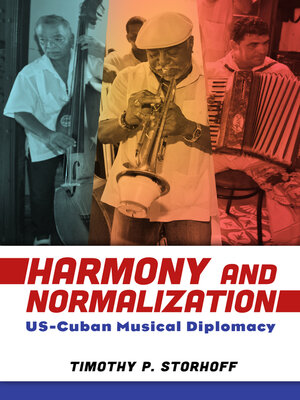
Sign up to save your library
With an OverDrive account, you can save your favorite libraries for at-a-glance information about availability. Find out more about OverDrive accounts.
Find this title in Libby, the library reading app by OverDrive.



Search for a digital library with this title
Title found at these libraries:
| Library Name | Distance |
|---|---|
| Loading... |
Harmony and Normalization: US-Cuban Musical Diplomacy explores the channels of musical exchange between Cuba and the United States during the eight-year presidency of Barack Obama, who eased the musical embargo of the island and restored relations with Cuba. Musical exchanges during this period act as a lens through which to view not only US-Cuban musical relations but also the larger political, economic, and cultural implications of musical dialogue between these two nations. Policy shifts in the wake of Raúl Castro assuming the Cuban presidency and the election of President Obama allowed performers to traverse the Florida Straits more easily than in the recent past and encouraged them to act as musical ambassadors. Their performances served as a testing ground for political change that anticipated normalized relations.
While government actors debated these changes, music forged connections between individuals on both sides of the Florida Straits. In this first book on the subject since Obama's presidency, musicologist Timothy P. Storhoff describes how, after specific policy changes, musicians were some of the first to take advantage of new opportunities for travel, push the boundaries of new regulations, and expose both the possibilities and limitations of licensing musical exchange. Through the analysis of both official and unofficial musical diplomacy efforts, including the Havana Jazz Festival, the National Symphony Orchestra of Cuba's first US tour, the Minnesota Orchestra's trip to Havana, and the author's own experiences in Cuba, this ethnography demonstrates how performances reflect aspirations for stronger transnational ties and a common desire to restore the once-thriving US-Cuban musical relationship.
While government actors debated these changes, music forged connections between individuals on both sides of the Florida Straits. In this first book on the subject since Obama's presidency, musicologist Timothy P. Storhoff describes how, after specific policy changes, musicians were some of the first to take advantage of new opportunities for travel, push the boundaries of new regulations, and expose both the possibilities and limitations of licensing musical exchange. Through the analysis of both official and unofficial musical diplomacy efforts, including the Havana Jazz Festival, the National Symphony Orchestra of Cuba's first US tour, the Minnesota Orchestra's trip to Havana, and the author's own experiences in Cuba, this ethnography demonstrates how performances reflect aspirations for stronger transnational ties and a common desire to restore the once-thriving US-Cuban musical relationship.







